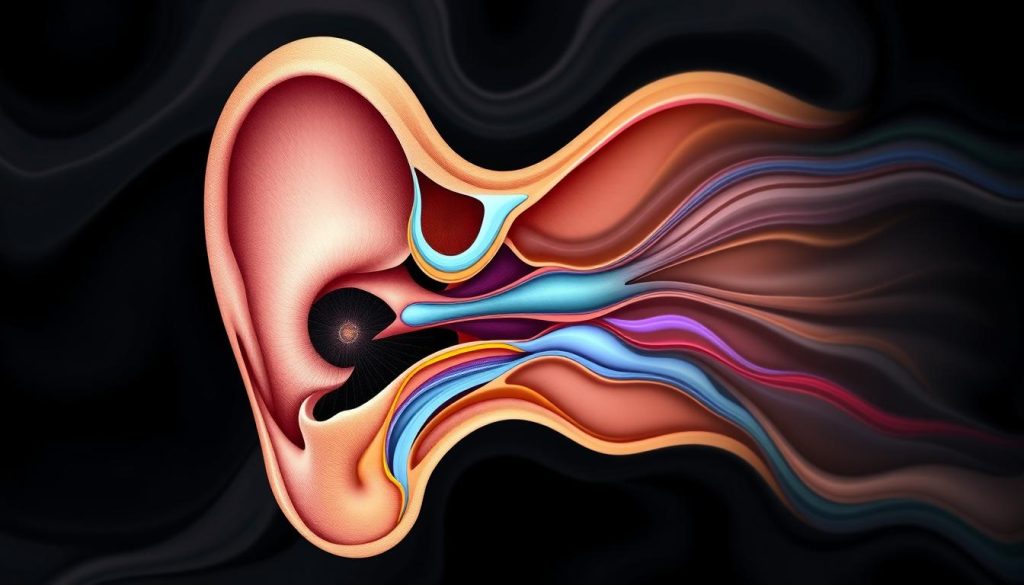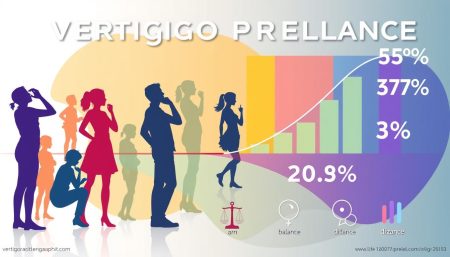Vertigo can make your world spin. It often brings a feeling of being off-balance. Besides dizziness, you might also feel nauseous and have trouble with balance.
Knowing these symptoms is key. They can vary from mild to severe, impacting your daily life. This guide will help you recognize the signs of vertigo early. We’ll look at the main symptoms and how they affect your health.
What Are The Symptoms of Vertigo: A Comprehensive Overview
Vertigo symptoms can be very confusing and upsetting. The main sign is a feeling of spinning, like you or things around you are moving. This feeling of dizziness can start suddenly and last for a few seconds or hours.
Another common symptom is trouble with balance. You might feel shaky on your feet or have trouble walking straight. Some people say it feels like being drunk without drinking alcohol.
Many people also feel nauseous when they have vertigo. The spinning can make your stomach upset, leading to vomiting in some cases. Other symptoms include:
- Headaches
- Ringing in the ears
- Sweating
- Vision problems
Vertigo symptoms can vary in how bad they are. Some people might just feel a little dizzy, while others might feel very sick and unable to do daily things. If you’re feeling these symptoms, it’s important to see a doctor for help.
“Vertigo is not just feeling dizzy. It’s a specific type of dizziness where you feel like you or the world around you is spinning or moving.”
Knowing what these symptoms are is the first step to dealing with vertigo. By recognizing them early, you can get the right care and find relief from this unsettling condition.
Understanding the Primary Physical Symptoms of Vertigo
Vertigo can make you feel off-balance and disoriented. It has clear physical signs that can affect your daily life. Let’s look at the main symptoms of vertigo.
Intense Spinning Sensations
The main sign of vertigo is feeling like you’re spinning. It’s like the world is moving around you. This feeling can cause nausea or make it hard to stay balanced.
The spinning can last just a few seconds or go on for hours. Its intensity can change.
Loss of Balance and Coordination
Many people with vertigo struggle to stay balanced. They might feel shaky or have trouble walking straight. This makes everyday tasks harder and raises the chance of falling.
Some feel like they’re being pulled to one side or feel like they’re tilting.
Involuntary Eye Movements (Nystagmus)
Nystagmus is a big sign of vertigo. It’s when your eyes move quickly and on their own, often side to side or up and down. These movements can make your vision blurry and make dizziness worse.
Doctors look for nystagmus when they diagnose vertigo. It often points to problems in the inner ear.
- Rapid eye movements
- Blurred vision
- Increased dizziness
Knowing these symptoms can help you spot vertigo early. If you keep feeling like you’re spinning or have big balance issues, get medical help right away.
Secondary Symptoms Associated with Vertigo Episodes
Vertigo episodes can cause more than just a feeling of spinning. Many people also face other symptoms that can be very distressing. Let’s look at these secondary effects that often come with vertigo.
Nausea and Vomiting
The intense dizziness of vertigo can make you feel nauseous and want to vomit. This happens because your brain gets mixed signals. Some people might just feel a little queasy, while others might get very sick and vomit a lot.
Excessive Sweating
During a vertigo attack, you might sweat a lot. This is your body’s way of reacting to the stress of the episode. You might sweat all over, feeling clammy and uncomfortable.
Headaches and Migraines
Headaches often come with vertigo, ranging from mild to severe migraines. These headaches can last even after the vertigo symptoms go away. This adds to the overall discomfort of the condition.
| Symptom | Frequency | Duration |
|---|---|---|
| Nausea | Common | During vertigo episode |
| Vomiting | Less frequent | Short-lived |
| Sweating | Common | Throughout episode |
| Headache | Variable | Can persist after episode |
Knowing about these secondary symptoms helps manage vertigo better. If your symptoms are severe or last a long time, see a healthcare professional. They can help with the right diagnosis and treatment.
Inner Ear Problems and Vertigo Connection
The inner ear is key for balance and knowing where we are in space. When it gets sick, vertigo often shows up. This link explains why ear troubles can cause balance issues and sometimes hearing loss.

The vestibular system in the inner ear has three semicircular canals and two otolith organs. These parts help us know when our head moves or changes position. They send signals to the brain to keep us balanced. But, if they don’t work right, we might feel dizzy, have trouble walking, or hear strange sounds.
- Dizziness and spinning sensations
- Difficulty walking or standing
- Nausea and vomiting
- Ringing in the ears (tinnitus)
- Hearing loss in some cases
Some common ear problems that can cause vertigo are:
| Condition | Description | Primary Symptoms |
|---|---|---|
| Benign Paroxysmal Positional Vertigo (BPPV) | Displacement of tiny crystals in the inner ear | Brief episodes of intense vertigo triggered by head movements |
| Meniere’s Disease | Buildup of fluid in the inner ear | Vertigo, hearing loss, tinnitus, and ear fullness |
| Labyrinthitis | Inflammation of the inner ear labyrinth | Severe vertigo, balance problems, and possible hearing loss |
Understanding how ear problems and vertigo are linked can help doctors find the right treatment. This way, people can get back to feeling balanced and living their lives fully.
Duration and Intensity of Vertigo Episodes
Vertigo episodes can vary a lot in how long they last and how bad they feel. Knowing these patterns helps manage symptoms and find the right treatment. Let’s look at the different types of vertigo episodes and what they’re like.
Acute Vertigo Episodes
Acute vertigo is sudden and very intense. These episodes can last from a few seconds to days. People often feel like the room is spinning.
It may be linked to conditions such as benign paroxysmal positional vertigo. This can cause brief but severe bouts of dizziness.
Chronic Vertigo Patterns
Chronic vertigo means having episodes that keep coming back over a long time. These can really affect daily life. Symptoms might not be as bad as acute episodes but can last weeks or months.
Conditions like Meniere’s disease often lead to chronic vertigo. This requires long-term management strategies.
Triggering Factors and Timing
Many things can make vertigo episodes worse or start them. Common triggers include:
- Sudden head movements
- Changes in position
- Stress and anxiety
- Certain foods or beverages
- Lack of sleep
Knowing what triggers your vertigo can help you avoid it. Some people notice their symptoms happen more at certain times, like in the morning or evening.
| Type | Duration | Intensity | Common Causes |
|---|---|---|---|
| Acute Vertigo | Seconds to days | High | BPPV, vestibular neuritis |
| Chronic Vertigo | Weeks to months | Moderate to high | Meniere’s disease, migraines |
Knowing your vertigo patterns is key to managing it well. If your symptoms are frequent or severe, see a healthcare provider. They can find the cause and create a treatment plan just for you.
Impact of Vertigo on Daily Activities

Vertigo can really mess up your daily life. It makes simple tasks hard because of the constant dizziness and balance issues. People with vertigo often find it hard to walk straight, drive, or even stand up without feeling off balance.
Work becomes tough when vertigo hits. Looking at computer screens or paperwork can make symptoms worse, leading to less productivity. Some people might need to take time off or change their work schedules to cope with their condition.
Social activities also get hit hard by vertigo. The fear of having an episode in public can make people stay away from crowds. This can hurt their relationships and lower their quality of life.
“Living with vertigo is like trying to navigate through a world that’s constantly spinning. It affects every aspect of your daily activities.”
Household chores become big challenges. Simple tasks like bending over, reaching high shelves, or doing laundry can trigger vertigo. This can lead to a messy home or needing help from others.
Exercise and physical activities are also tough. Balance problems make it risky to do some sports or fitness routines. But, some exercises can help manage vertigo symptoms if done right.
Despite these hurdles, many people with vertigo find ways to adapt. They learn to spot triggers and find ways to manage their symptoms well. With the right treatment and lifestyle changes, it’s possible to lessen vertigo’s impact on daily life and live a fulfilling life.
Distinguishing Vertigo from General Dizziness
Vertigo and dizziness are often mixed up, but they’re different. Knowing the differences is key for the right diagnosis and treatment. Let’s look at the main symptoms and how doctors tell them apart.
Key Differences in Symptoms
Vertigo makes you feel like you or things around you are spinning. Dizziness is a wider term for feeling lightheaded, unsteady, or faint. Vertigo can also bring nausea, vomiting, and trouble balancing.
Those with dizziness might feel weak or off-balance without the spinning feeling.
Medical Assessment Criteria
Doctors have specific ways to spot vertigo. They might use the Dix-Hallpike maneuver to check for certain vertigo types. Balance tests, eye movement checks, and hearing exams are also part of the assessment.
Blood tests and imaging studies might be needed to find underlying issues.
- Detailed patient history
- Physical examination
- Vestibular function tests
- Neurological exams
If you’re always dizzy or feel like you’re spinning, get checked by a doctor. They can figure out if it’s vertigo or another kind of dizziness. This way, you get the right care and treatment.
Emergency Warning Signs During Vertigo Episodes
Vertigo symptoms can be scary, but some signs need immediate help. Severe dizziness with sudden hearing loss or ringing in the ears might mean a serious problem. These signs should not be ignored, as they could point to a serious condition.
Vertigo with chest pain, shortness of breath, or an irregular heartbeat is a warning. These could be signs of heart issues that need quick attention. Sudden, severe headaches or vision changes during vertigo also need immediate medical help. These could be signs of neurological problems.
Vertigo with facial drooping, slurred speech, or weakness on one side of the body could be a stroke. In such cases, every minute is crucial. If you see these signs, call emergency services right away. Quick medical help can greatly improve treatment outcomes for severe vertigo-related conditions.
FAQ
Q: What are the main symptoms of vertigo?
A: Vertigo makes you feel like you’re spinning, even when you’re not. You might also feel dizzy, lose your balance, and have trouble coordinating. Some people get eye movements they can’t control, feel sick to their stomach, and throw up.
Q: How long do vertigo episodes typically last?
A: Vertigo episodes can last anywhere from a few seconds to hours or even days. Some people have episodes that come and go, while others have them all the time. How long and how often they happen can vary a lot.
Q: Can inner ear problems cause vertigo?
A: Yes, problems in the inner ear are a common cause of vertigo. Issues with the vestibular system can cause balance problems and vertigo. Sometimes, these problems can also lead to hearing loss.
Q: How does vertigo affect daily activities?
A: Vertigo can make everyday tasks hard because of dizziness and balance issues. It can be tough to walk, drive, or even work. It also raises the risk of falling or getting hurt.
Q: What’s the difference between vertigo and general dizziness?
A: Vertigo makes you feel like you’re spinning, even when you’re still. General dizziness feels more like being lightheaded or unsteady but without the spinning. Doctors use special tests to tell the difference.
Q: Are there any emergency warning signs during vertigo episodes?
A: Yes, some signs that mean you need to get help right away include sudden severe headaches, chest pain, trouble breathing, vision changes, speech problems, or weakness on one side. If you see these, get medical help fast.
Q: Can vertigo cause sweating and headaches?
A: Yes, vertigo can make you sweat a lot and give you headaches or migraines. These symptoms happen because your body is reacting to the dizziness and disorientation of vertigo.
Q: Are there specific triggers for vertigo episodes?
A: Vertigo can be triggered by things like sudden head movements, stress, certain sights, or changes in position. Some people get vertigo because of certain health conditions or as a side effect of some medicines.


















